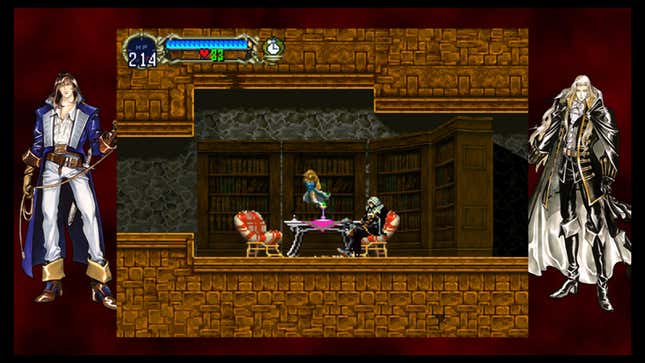
Let’s talk about one of my least favorite words in the video game lexicon: metroidvania. A portmanteau combining the video game titles Metroid and Castlevania, it takes two made-up video game titles that are pretty cool and evocative on their own and inelegantly mashes them into something worse. And now, that word is one we use to talk about a whole genre of incredible video games.
Let us count the ways the word is a disaster. Aesthetically, it’s miserable and inefficient, five syllables in the mouth and rakish in the ear. Worse, it is completely meaningless to anyone unfamiliar with either of its root words. Words which are also portmanteaus—Metroid, the story goes, is a combination of the words “metro” and “android.” Castlevania, meanwhile, is a merging of the words “castle” and “Transylvania” into something that actually worked out pretty well.
Imagine stringing out all those words individually: metro android castle transylvania. It is both 1.) way cooler, and 2.) far too much to dump on a person and expect them to know what you mean.
Years of use have acclimated people who play and talk about games a lot to the convenience of “metroidvania,” and it doesn’t hurt that the game that it most often points to, 1997’s Castlevania: Symphony of the Night, was a watershed moment in video games, reinventing one classic franchise by borrowing liberally from another. (The borrowing, ironically, came not so much from Metroid but from The Legend of Zelda.) So influential was Symphony that the term “metroidvania”, which was apparently cooked up and popularized by former 1UP.com writers Scott Sharkey and Jeremy Parish sometime in the early 2000s, was used to denote a formal movement of video game design, with Symphony of the Night as the template.
Here’s where my other problem with “metroidvania” comes into play: It’s at odds with the language we use to talk about video game genre.
Video game genres tend to be categories of interaction. They describe what you do in a video game at a glance. A first-person shooter puts a gun in a character’s hands and a camera where their eyes would be. A turn-based strategy game involves board game-style interactions in the service of a specific goal.
These aren’t perfect terms; they’re not as evocative as genre categories in, say, film, where terms like “horror,” “romance” and “comedy” describe emotions and feelings that you might expect to experience as a viewer. But there’s a logic to them, and they serve a purpose: establishing the ground rules of how you’re going to interact with a game. In that way, video game genre terms are most similar to genres of music, which use a certain set of basic rules for works in categories both broad and specific. Blues tunes will likely use blues scales and lots of improvisation. Conversely, baroque four-part chorales will adhere to an extremely rigid set of rules of composition.
I used to write about video games at publications geared towards people who didn’t necessarily play a lot of games, so I have spent a lot of time thinking about words that we’ve become accustomed to but are really just nonsense to anyone outside of this particular subculture. In real life, too, I’ve seen how quickly someone’s eyes can glaze over when they’re presented with something outside their comfort zone. Reducing those potential pain points in the way we talk about games can do a lot to help more people join in on that conversation, especially if it’s as painless as ditching a word like “metroidvania.”
Genre terms are more for our benefit more than that of the art in question. Genre is a loose system that we have for talking about similar works and establishing canon—an academic exercise more than an artistic one. Those conversations are valuable and sometimes even vital works of scholarship, but they also tend to be exclusive, understandable only to those already steeped in the culture.
Video games need to be easier to parse, not harder. We talk a lot about diversity and inclusion in games—how we games could become a better, more welcoming space if we just figured out a way to represent more perspectives both in the games we play and in the studios that make them. These are necessary, urgent steps. But I also wonder how many people have never bothered because we’ve spent all this time using the wrong words.




